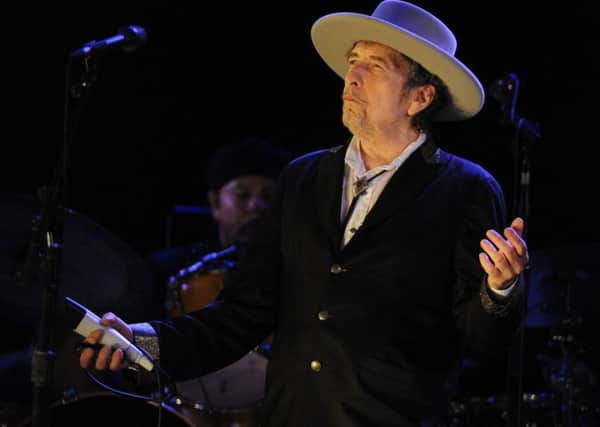Dominic Hinde: Dylan's Nobel Prize part of Sweden's '˜American Dream'


When the door to the meeting room of the Swedish Academy opened and its permanent secretary emerged to mouth the words ‘Bob Dylan’ this morning the world went into shock.
The guilded surroundings of the Academy’s premises seemed entirely out of sync with the name that emerged from Sara Danius’ lips.
Advertisement
Hide AdAdvertisement
Hide AdFor an institution that has acted as a benchmark of quality and breadth in world literature for most of the last century and all of this, it seemed an odd choice.
Not least because when you look through his list of Dylan’s published works only one, Tarantula, might be considered a standalone literary endeavour, and one which has received a mixed reception at that.
Look closer though and it makes perfect sense.
Although the Nobel award is an international literature prize, it is judged entirely by members of the Swedish Academy, all of whom are Swedish.
Moreover, to become a member of the Swedish academy you have to have had a distinguished or notable impact in Swedish academia and cultural life, meaning that most of its members will have grown up knowing Dylan not as a man endlessly touring medium-sized festivals but as a cultural icon, and to a degree also a political one.
The youngest member of the Academy is the writer Sara Stridsberg, born in 1972 (incidentally, she recently wrote what can only be described as a Joy Division musical, the commodification of British post punk having a similar role to Dylan amongst middle class Swedes of a certain age).
This means that its global reach is always dependent on a particularly Swedish perspective, and Dylan is no exception.
Sweden has always been fascinated by both American counter culture and pop culture and tried to find different ways to engage with it.
One of the most talked about documentaries of the last decade on American society, The Black Power Mixtape, was made by a Swede, and the country has an apparently insatiable appetite for the US whilst at the same time disapproving of and rejecting its political system world view.
Advertisement
Hide AdAdvertisement
Hide AdBy awarding the prize to Dylan the academy no doubt see themselves as participating in and rewarding generational cultural politics and recognising a different America to the one currently filling the news headlines.
Dylan has pedigree when it comes to winning prizes in Sweden; in 2000 he was awarded Polarpriset, Swedens biggest music prize.
In the past the prize has also gone to that other chronicler of American counter culture, Bruce Springsteen, and Emmylou Harris.
When Harris won in 2015 she was serenaded by First Aid Kit, the hugely successful suburban new-country duo from Stockholm who have built a career on Swedish reworks of American music, complete with artificial southern twang.
As one Swedish journalist joked when Dylan’s name was announced, it may just have been an elaborate plot to get Dylan and First Aid Kit in the same room so they could awkwardly play him a cover of his own songs.
More seriously though, Dylan will have been chosen for reasons far beyond his worth as a poet or musician.
The academy likes to choose people who represent not just their own work but certain ideas about specific countries or cultures.
When the German-Romanian writer Hertha Mueller received the prize in 2009 it was justified by her poetic descriptions of homelessness.
Advertisement
Hide AdAdvertisement
Hide AdLast year’s winner Svetlana Aleksijevitj, the Belarussian author and journalist, coincided with an age old but increasing concern in Sweden with the plight of its near neighbours in the east.
It was no coincidence either that when Seamus Heaney took home the award in 1995 the beginnings of a new period in Irish history were underway as the peace process became a meaningful prospect.
At its best the Academy shows an interest in the stories and problems of other countries and cultures, at its worse a type of essentialised appropriation which uses individual writers as stand-ins for entire countries.
With Dylan the committee seems to have tried to tap into a previously inaccessible but hugely popular part of 20th century America.
But in this synthesis of artistic merit and topical geographical choice there is hope for Scotland.
With another independence referendum perhaps on the cards the Alasdair Grays of the this world should hope that timing is in their favour, and that Caledonian chic is in the minds’ eye of Stockholm’s cultural classes.
• Dominic Hinde is a foreign correspondent and cultural journalist covering northern Europe